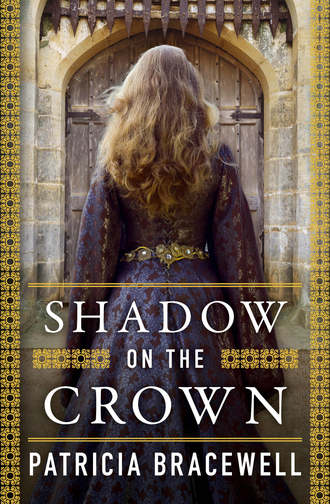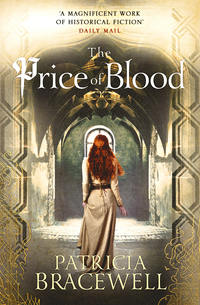
Полная версия
Shadow on the Crown
There was one other child – Mathilda, the youngest and barely two years old – whom she had not met, for the girl had been installed in a convent shortly after her mother died. It was not unusual for the daughters of kings and wealthy magnates to be consecrated to God, but Emma thought it hard that this child would have to live such a circumscribed life from so early an age. She could not imagine giving up a daughter of her own to such a life.
None of Æthelred’s children would be at Winchester just yet. The eldest had left on business of their own, and the youngest had been sent to some estate in the country. The purpose, ostensibly, was to give the king and his bride time alone together, unencumbered by the children of his first wife. Emma had laughed when she heard that, for she liked the king’s younger children far better than she liked the king.
In August, though, the children would return to Winchester. When they did, she must welcome them as a mother and a friend. If she could not give the king a child, then she must befriend her stepchildren, because her own safety – her very life – might one day lie in their hands. She was confident that she could win the affections of the girls and the youngest boys. It was the king’s three eldest sons – Athelstan, Ecbert, and Edmund – who presented the real challenge. Somehow she had to convince them that she was not a threat. How was she to do that, though, when everyone knew that her whole purpose was to give birth to a son who would be their rival for the king’s affection and largesse – and perhaps, one day, for the throne itself?

August 1002
Winchester, Hampshire
Æthelred stood beside a light-filled window embrasure in his private chamber and greeted the arrival of his eldest son with a grunt. He half anticipated another outburst of resentment like the one he had had to endure before he’d banished the pup to St Albans, and he did not relish the prospect.
Christ, he was weary of it all – the restless, sleep-troubled nights, the days of wrangling with councillors and churchmen, and underneath it all the incessant rumour of trouble that he knew was far more than rumour. He had dispatched this recalcitrant son of his to gather information, and now, eyeing Athelstan as he bent the knee with sober regard, Æthelred took heart. Perhaps the whelp was beginning to learn humility. Perhaps he would be of some use after all.
‘You followed my instructions?’ Æthelred asked, coiling himself into his chair and gesturing for his son to stand.
‘Yes, my lord.’
‘And do you understand the problem that I face?’
Athelstan inclined his head. ‘Some years ago you forged an alliance with Viking raiders who were ravaging our lands, you bade them serve you as mercenaries, and rewarded them with gold and properties. Now you have bands of well-trained, well-armed Vikings, most of them Danes, settled throughout your kingdom.’
Æthelred scowled. His son had grasped the situation well enough, if not the policy behind it.
‘I had little choice at the time,’ he said, ‘nor am I the first ruler to settle mercenaries in his realm. The Frankish king did it. Even the great Alfred was forced to allow Danes to settle north of the River Humber.’
‘But in Alfred’s time,’ his son said, his expression carefully bland, ‘the Danes settled in lands where few of Alfred’s people dwelt. Your mercenaries are in Devonshire, Hampshire, and Oxfordshire – in the very heart of your kingdom.’
His son did not say it, but Æthelred heard the unspoken accusation. He had placed a pack of wolves in the sheepfold.
‘I gave them estates,’ he growled, ‘and they gave their oaths that they would not turn against me.’
Yet they had done so, and with a vengeance. After several years of abiding by the pledges they had made to him, the dogs of war had been loosed upon England.
Æthelred, remembering, grimaced, and rubbed at a suddenly painful temple with his fingertips.
One of those dogs, Pallig, was wed to the half sister of Swein Forkbeard, and when Forkbeard had attacked the southern coast last year, Pallig and his men had joined in the assault. They had pillaged and burned all across Wessex, and the English host that rallied against them had failed to stop them.
He’d had no choice but to bribe the lot of them yet again to leave his realm in peace. Forkbeard had taken his gold to his ships and sailed east, but Pallig had merely made new pledges of peace and retreated to his estates. He and others like him were like boils upon the land that would, one day, erupt to plague him once more. He could not trust them.
‘You spoke to Pallig?’ he asked.
‘I spoke with Pallig and with his wife, Gunhild.’
‘Think you he will keep his oaths to me?’ He watched his son closely and spotted the hesitation before the answer was given. So the lad, too, saw the threat.
‘My lord,’ Athelstan said, ‘Pallig is no farmer. He is a mercenary down to his soul – an adventurer who thrives on danger and excitement. If you do not put him to some use, he will make more mischief in spite of his pledges to you.’
Æthelred waved the suggestion away.
‘Once before I set the fox to guarding the chickens and I paid the price. I will not make that mistake again. Pallig may be living on estates that I granted him, but he is Swein’s man at heart. He is like a knife at my throat.’
‘No, my lord,’ his son objected. Æthelred glared at his presumption but let him have his say. ‘Pallig is more like a kingdom unto himself,’ Athelstan went on, ‘not bound to any man. He takes whatever he feels is his by right and by force of arms. It is not the having that he loves, it is the getting. If you could but find a way to bend him to your will—’
‘Men like Pallig do not bend!’ he snarled. ‘Best you learn that now, boy. If money will not sway him, nothing will.’ Good Christ, he had dealt with vermin like Pallig for two decades; he knew them far better than this cub of his, who had not yet seen eighteen summers.
Athelstan frowned at his father, sympathy for the king’s dilemma warring with exasperation. That England was beset by enemies from within as well as from without was the king’s own doing. Granted, the marriage to Emma might stem the tide of Viking raids, but Æthelred had made a devil’s bargain when he had given land to men like Pallig. They were like feral dogs that must be tamed and muzzled. He could think of only one way to do it.
‘Pallig has a son, my lord,’ he said urgently, ‘newly born. Take the boy as hostage for his father’s good behaviour.’ If the boy were raised at court, he would become English and no Dane. Build trust with one child, and others, no doubt, would follow.
‘Hostage?’ Æthelred almost spat the word. ‘It is far too late for that now. We might have made it a condition in March, before we made the gafol payment, but now we have nothing with which to bargain. Pallig will not willingly hand his son over to me.’ He fingered his beard, his face brooding and dark. ‘He is safe on his own lands, surrounded by his warriors, a law unto himself. Nor is he the only one. There are a dozen more like him, spread across the southern shires. Who is to say what schemes they may be plotting?’
Listening to his father’s groundless suspicions, Athelstan’s exasperation finally overcame his sympathy.
‘Who is to say that they are plotting any schemes at all?’ he demanded. ‘What if they are not? What if Pallig merely craves action? He is a shipman! Can you not put together a fleet and charge him with guarding our coast? My lord, what other choice have you?’
His father made no answer, and Athelstan, looking into a face that he suddenly realized was haggard and far too pale, felt a sudden chill along his spine, as if a blade had been drawn through ice and laid against his skin. The king was staring, red-rimmed eyes fixed and frightened, at something behind Athelstan. He whipped around, fearing to see some horror there, yet he saw nothing save a bank of candles whose meagre flames trembled in a shadowy corner, where the daylight did not reach.
He turned back to the king, and still his father stared, his face working as he mouthed a soundless cry, knuckles whitening as he clutched the carved dragon heads beneath his hands.
‘My lord!’ Athelstan cried. Was this some fever of the mind sprung from the cares that beset a king? Some disease that struck suddenly and left nothing but the shell of a man in its wake?
He reached out and clasped his father’s hand, and he was stunned by how cold the taut flesh felt beneath his palm. His own blood seemed to freeze in response, and he felt suddenly afraid that he was watching his father die.
He grasped the king’s shoulders and shook him, not knowing what else to do. In response the watery blue eyes came to rest upon his own, but the king’s distress seemed to become even more acute. His father bent forward, his body rigid as he beat his breast and moaned a wordless cry, tortured by some invisible enemy.
‘My lord!’ Athelstan cried again, raging at his helplessness. Why did no one hear him, no one come to offer aid?
Yet even as he formed that thought, his father’s body relaxed, and the bent head dropped into the king’s slender hands. Athelstan’s panic eased, and he felt as if he had just wakened from a nightmare.
Slowly his father raised his head, and now his face was creased and grey as the wide eyes fixed purposefully on Athelstan.
‘What did you see?’ the king demanded in a hoarse, urgent whisper.
Athelstan hesitated, unnerved by the intensity of his father’s gaze, his mind groping desperately for a response that would appease the king.
‘I saw shadows, my lord,’ he replied at last. ‘Only shadows.’ And I saw a king half mad with fear, he thought. But of that he dared not speak.
His father drew a long breath and released it as he repeated Athelstan’s response.
‘Only shadows,’ he whispered, and he pressed his hands against his eyes, as if he would banish whatever baleful vision lingered there.
Athelstan roused himself to fetch wine from the nearby table that held cups and a flagon. He watched while his father drank, and a hundred questions formed in his mind.
‘Were you in pain?’ he asked. ‘Has this’ – he searched for some way to describe it – ‘affliction struck before?’
His father, much revived, it appeared, by the wine, threw him a dark, almost furtive glance.
‘It was but weariness, nothing more,’ he murmured. ‘It has passed now. There are far weightier matters to occupy both my mind and yours. You will forget it.’ He left his chair and began to pace, restless and distracted. ‘There have been signs,’ he said heavily, ‘of trouble to come. I have seen portents—’ He flung up an arm as if to sweep away his own words. ‘Nay, I need no portents to know that Pallig is dangerous. As you say, he is no farmer. Neither are the men who answer to him. They will become restless, and then they will strike.’
The next moment the chamber door opened, and his father’s steward, Hubert, entered carrying a packet of documents. The king raised a hand to forestall whatever Hubert might say and looked gravely at Athelstan.
‘Did you see any indications that Pallig was preparing for battle?’
‘No, my lord,’ he said, mystified both by what he had just witnessed as well as by his father’s apparent determination to ignore it.
The king grimaced, as if that was not the answer he had anticipated. ‘Then there is nothing more to do, for now.’ He brushed past Athelstan as he made for his chair and beckoned to the steward. ‘Leave me. I have business with Hubert.’
Athelstan stood there for a moment, troubled, unwilling to leave before he had gained a better understanding of what he had just seen. But both men ignored him, and he knew better than to disobey his father’s command. He strode slowly from the chamber and, glancing back, he saw his father’s eyes now fixed hard upon him, and in those eyes was a warning that it would be perilous for him to ignore.
As he made his way through the great hall, something that Bishop Ælfheah had said to him in the spring came back to him: The king is troubled in his mind. Had the bishop been witness to a similar occurrence, then? Ælfheah had not explained himself, and Athelstan dared not question him about it now. That threatening glance from his father had commanded his silence. He stepped from the royal apartments into the sunshine of late summer, his mind still wrestling with the king’s strange behaviour and his talk of signs and portents.
Yet he, too, had been given a sign by the seeress near Saltford – albeit one he was unwilling to believe. And last winter there had been rumours from the north that men had seen columns of light shimmering in the night sky – fierce angels with swords, it was said, come to punish men for their sins.
Truth to tell, his father was not the only one disturbed by such portents, yet what steps could anyone take to vanquish foreboding or to prevent some cataclysm that was lurking in the future? And then, recalling his interview with the king, he knew with certainty that his father must be planning steps of some kind. Why else had he been sent to speak with Pallig? Yet if his father did have some presentiment of disaster might not his very efforts to avert it bring about the misfortune that he so dreaded?
Конец ознакомительного фрагмента.
Текст предоставлен ООО «ЛитРес».
Прочитайте эту книгу целиком, купив полную легальную версию на ЛитРес.
Безопасно оплатить книгу можно банковской картой Visa, MasterCard, Maestro, со счета мобильного телефона, с платежного терминала, в салоне МТС или Связной, через PayPal, WebMoney, Яндекс.Деньги, QIWI Кошелек, бонусными картами или другим удобным Вам способом.



